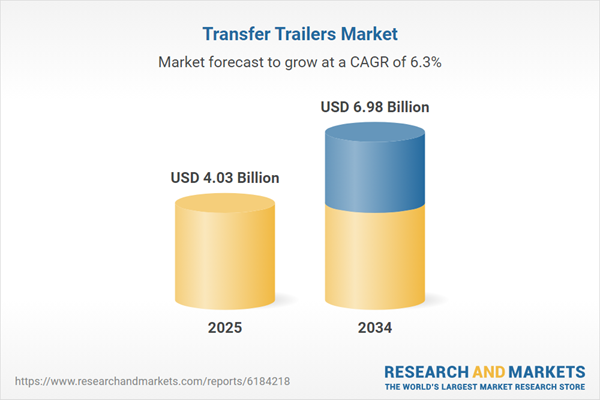Transfer Trailers Market
Transfer trailers, also known as walking-floor, tipper, or detachable body trailers, are specialized hauling solutions used for transporting loose bulk materials such as municipal solid waste, recyclables, aggregates, biomass, agricultural commodities, construction debris, and wood chips. Their core function is to enable efficient loading, unloading, and transfer between tractor units or multiple containers, optimizing routing and payload utilization. The market is driven by expanding waste management and recycling infrastructures, infrastructure and construction activity, and agricultural logistics modernization. Walking-floor systems are prized for safety and controlled unloading; tipper and hydraulic dump configurations support faster discharge for aggregates and demolition debris. Lightweight yet durable designs using aluminum alloys, high-strength steel, and composite reinforcements are increasingly prioritized to enhance payload capacity and fuel efficiency. Regulatory pressures on emissions, weight limits, and road safety shape design selection, while fleet operators seek solutions with lower maintenance intervals, stronger corrosion resistance, and improved total cost of ownership. Competition spans global trailer manufacturers, regional fabricators, and custom engineering shops; differentiation is achieved through chassis durability, floor system reliability, service networks, telematics integration, and customization options for payload type and operating environment. Key market trends include electrified and hybrid powertrains for auxiliary systems, greater use of telematics for load tracking and preventative maintenance, and increased use of multi-container “transfer sets” to reduce turnaround times at landfills and MRFs. Despite steel and aluminum price volatility and variable construction demand cycles, replacement demand, fleet upgrades, and recycling industry expansion continue to support steady adoption.Transfer Trailers Market Key Insights
- Waste and recycling infrastructure remains a primary demand anchor. Growing collection volumes, landfill diversion initiatives, and centralized material recovery facilities drive consistent use of transfer trailers for longer-haul waste transport. Municipal, private haulers, and integrated waste companies value payload efficiency and reliability over long duty cycles.
- Walking-floor systems gain preference in mixed waste and recyclables. Walking-floor mechanisms offer controlled discharge in confined or uneven unloading sites, reducing tip-over risk compared to dump trailers. These systems provide flexibility for mixed waste streams, compost, biomass, and wood chips, supporting diversified fleet utilization.
- Construction and aggregates provide cyclical but impactful demand. Infrastructure upgrades, quarry operations, and road-building projects require high-durability, abrasion-resistant floor and wall materials. Tipper-style transfer trailers remain favored for fast turnaround, but operators increasingly consider hybrid designs that allow more flexible year-round usage.
- Agricultural logistics modernization expands adoption. Grain, silage, feed, and crop residue hauling often transition from traditional trucks to lightweight transfer trailers for longer-distance movement and improved unloading control. Corrosion-resistant coatings and easy-clean interior designs are growing differentiators.
- Material innovation targets weight reduction. Aluminum and high-strength steel frames, reinforced cross-member systems, and composite liners allow higher legal payloads while maintaining durability. Weight optimization directly impacts fuel consumption, route economics, and regulatory compliance.
- Maintenance and uptime drive fleet purchasing decisions. Buyers increasingly evaluate floor slat longevity, hydraulic system reliability, replacement part availability, and service proximity. Preventative maintenance scheduling supported by telematics is gaining traction among larger fleets.
- Safety and stability requirements influence design choices. Lower centers of gravity, anti-tip geometries, integrated load restraint, and ground-level maintenance access features reduce risk and improve operator confidence. Walking-floor designs are preferred where uneven unloading terrain is common.
- Telematics and digital fleet management adoption grows. Real-time trailer location, load status, door/pressure monitoring, and automated maintenance alerts help fleet operators reduce downtime and improve route efficiency, especially in multi-site waste and recycling logistics networks.
- Environmental and sustainability considerations rise. Optimizing payload efficiency reduces fuel use and emissions, while recyclable trailer materials, corrosion-resistant coatings, and automated unloading systems align with sustainability goals. Some fleets explore hybrid or electric auxiliary systems for hydraulic power.
- Replacement and fleet renewal cycles sustain long-term demand. Despite fluctuations in construction activity, high utilization and harsh working conditions mean transfer fleets regularly require refurbishment or replacement. Standardized modular components simplify rebuilds, extending operating life cycles.
Transfer Trailers Market Reginal Analysis
North America
The region leads in transfer trailer adoption due to mature waste collection networks, long-haul landfill transfer routes, and widespread recycling operations. Municipal contracts, private hauler fleets, and construction logistics drive steady replacement demand. Lightweight aluminum and high-strength steel designs are widely adopted, while telematics and preventative maintenance tools gain traction among larger fleet operators.Europe
Regulatory focus on emissions, vehicle weight optimization, and waste diversion strongly shapes trailer specifications. Transfer trailers support waste-to-energy networks and cross-border recycling shipments. Walking-floor trailers are common for biomass and chipboard supply chains. Regional manufacturers emphasize corrosion resistance, modular chassis repairability, and compliance with European transport safety standards.Asia-Pacific
Growing urbanization and industrial development expand waste management and construction haulage requirements. Adoption is diversified by market maturity: developed economies emphasize safety and weight-optimized designs, while emerging markets prioritize durable, cost-effective configurations. Expanding biomass and pulp industries support walking-floor trailer growth in certain subregions.Middle East & Africa
Infrastructure development and waste collection systems are evolving, supporting gradual adoption of transfer trailers, particularly for construction aggregates and municipal waste in urban centers. Extreme climate conditions drive preference for corrosion-resistant materials and robust hydraulic systems. Local trailer fabrication and service partnerships are key to market entry.South & Central America
Industrial, agricultural, and waste-hauling needs create consistent but cost-sensitive demand. Brazil, Mexico, and Chile show higher adoption linked to urban waste infrastructure modernization and agribusiness logistics. Local assembly, service availability, and financing support are critical purchasing factors as fleets balance performance with affordability.Transfer Trailers Market Segmentation
By Type
- Single Axle Transfer Trailers
- Dual Axle Transfer Trailers
- Tandem Axle Transfer Trailers
- Specialized Transfer Trailers
- Others
By Application
- Waste Management
- Container Transport
- Construction Materials
- Automotive Parts and Assembly
- Others
By Load Capacity
- Up to 15 Tons
- 15 to 30 Tons
- Above 30 Tons
By Material
- Steel
- Aluminum
- Composite Materials
Key Market players
Mac Trailer, Langfab Fabricators Ltd, Wesco Trailer, K‑Line Trailers, Manac, J & J Truck Bodies & Trailers, Ludwig Bergmann GmbH, Wastech, JBT, Ace Brothers Equipment, Warren Equipment Company, Shur‑Co, ARCAT, Bernard Krone Holding SE & Co. KG, Schwarzmüller Group.Transfer Trailers Market Analytics
The report employs rigorous tools, including Porter’s Five Forces, value chain mapping, and scenario-based modelling, to assess supply-demand dynamics. Cross-sector influences from parent, derived, and substitute markets are evaluated to identify risks and opportunities. Trade and pricing analytics provide an up-to-date view of international flows, including leading exporters, importers, and regional price trends.Macroeconomic indicators, policy frameworks such as carbon pricing and energy security strategies, and evolving consumer behaviour are considered in forecasting scenarios. Recent deal flows, partnerships, and technology innovations are incorporated to assess their impact on future market performance.
Transfer Trailers Market Competitive Intelligence
The competitive landscape is mapped through proprietary frameworks, profiling leading companies with details on business models, product portfolios, financial performance, and strategic initiatives. Key developments such as mergers & acquisitions, technology collaborations, investment inflows, and regional expansions are analyzed for their competitive impact. The report also identifies emerging players and innovative startups contributing to market disruption.Regional insights highlight the most promising investment destinations, regulatory landscapes, and evolving partnerships across energy and industrial corridors.
Countries Covered
- North America - Transfer Trailers market data and outlook to 2034
- United States
- Canada
- Mexico
- Europe - Transfer Trailers market data and outlook to 2034
- Germany
- United Kingdom
- France
- Italy
- Spain
- BeNeLux
- Russia
- Sweden
- Asia-Pacific - Transfer Trailers market data and outlook to 2034
- China
- Japan
- India
- South Korea
- Australia
- Indonesia
- Malaysia
- Vietnam
- Middle East and Africa - Transfer Trailers market data and outlook to 2034
- Saudi Arabia
- South Africa
- Iran
- UAE
- Egypt
- South and Central America - Transfer Trailers market data and outlook to 2034
- Brazil
- Argentina
- Chile
- Peru
Research Methodology
This study combines primary inputs from industry experts across the Transfer Trailers value chain with secondary data from associations, government publications, trade databases, and company disclosures. Proprietary modeling techniques, including data triangulation, statistical correlation, and scenario planning, are applied to deliver reliable market sizing and forecasting.Key Questions Addressed
- What is the current and forecast market size of the Transfer Trailers industry at global, regional, and country levels?
- Which types, applications, and technologies present the highest growth potential?
- How are supply chains adapting to geopolitical and economic shocks?
- What role do policy frameworks, trade flows, and sustainability targets play in shaping demand?
- Who are the leading players, and how are their strategies evolving in the face of global uncertainty?
- Which regional “hotspots” and customer segments will outpace the market, and what go-to-market and partnership models best support entry and expansion?
- Where are the most investable opportunities - across technology roadmaps, sustainability-linked innovation, and M&A - and what is the best segment to invest over the next 3-5 years?
Your Key Takeaways from the Transfer Trailers Market Report
- Global Transfer Trailers market size and growth projections (CAGR), 2024-2034
- Impact of Russia-Ukraine, Israel-Palestine, and Hamas conflicts on Transfer Trailers trade, costs, and supply chains
- Transfer Trailers market size, share, and outlook across 5 regions and 27 countries, 2023-2034
- Transfer Trailers market size, CAGR, and market share of key products, applications, and end-user verticals, 2023-2034
- Short- and long-term Transfer Trailers market trends, drivers, restraints, and opportunities
- Porter’s Five Forces analysis, technological developments, and Transfer Trailers supply chain analysis
- Transfer Trailers trade analysis, Transfer Trailers market price analysis, and Transfer Trailers supply/demand dynamics
- Profiles of 5 leading companies - overview, key strategies, financials, and products
- Latest Transfer Trailers market news and developments
Additional Support
With the purchase of this report, you will receive:- An updated PDF report and an MS Excel data workbook containing all market tables and figures for easy analysis.
- 7-day post-sale analyst support for clarifications and in-scope supplementary data, ensuring the deliverable aligns precisely with your requirements.
- Complimentary report update to incorporate the latest available data and the impact of recent market developments.
This product will be delivered within 1-3 business days.
Table of Contents
Companies Mentioned
- Mac Trailer
- Langfab Fabricators Ltd.
- Wesco Trailer
- K-Line Trailers
- Manac
- J & J Truck Bodies & Trailers
- Ludwig Bergmann GmbH
- Wastech
- JBT
- Ace Brothers Equipment
- Warren Equipment Company
- Shur-Co
- ARCAT
- Bernard Krone Holding SE & Co. KG
- Schwarzmüller Group.
Table Information
| Report Attribute | Details |
|---|---|
| No. of Pages | 160 |
| Published | November 2025 |
| Forecast Period | 2025 - 2034 |
| Estimated Market Value ( USD | $ 4.03 Billion |
| Forecasted Market Value ( USD | $ 6.98 Billion |
| Compound Annual Growth Rate | 6.3% |
| Regions Covered | Global |
| No. of Companies Mentioned | 15 |









